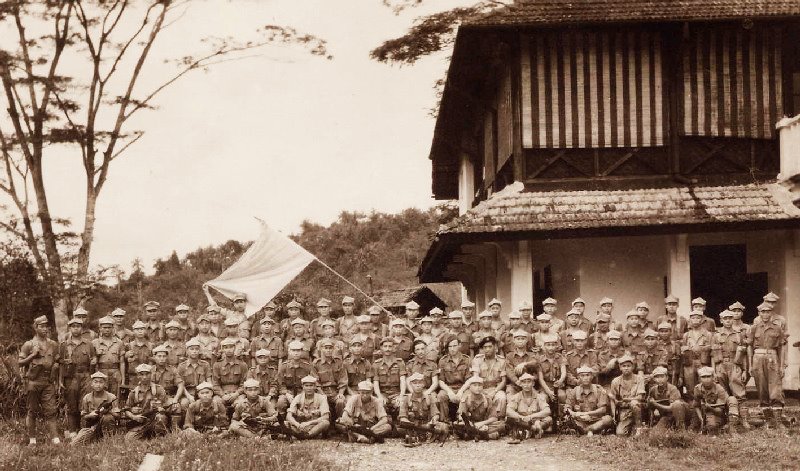Colonel Freddie Spencer Chapman

Commissioned into the Seaforth Highlanders, Chapman's love of the outdoor life and adventure lead to him being chosen for a mission in Australia. That mission was to trainAustralian and New Zealand forces in guerrilla warfare and eventually to join what was then Special Training School 101 (STS-101) in Singapore. This school had as one of its main objects the organization of parties to stay behind in areas the Japanese might overrun. In August 1941, a plan for stay-behind parties that would include local Indians, Chinese and Malays was proposed, but this was rejected by the British colonial governor, Sir Shenton Thomas, as extravagant and defeatist.
During the Japanese invasion the then Captain Chapman took part in an undercover raid across the Perak River in support of Rose Force. During the mission Chapman noticed how lightly equipped the Japanese soldiers were in contrast to the heavy kit of the British and Indian forces.
Throughout the war Chapman remained a thorn in the Japanese side, accounting for no less that seven trains, fifteen bridges and forty motor vehicles and the killing of some hundreds of Japanese troops in a short period of time at the beginning of Japanese occupation.
In early 1942, he ran out of supplies hidden for stay behind parties like his team. Freddie and his team then tried to escape from Malaya, but had to hide from the Japanese in the Malayan jungle with the help of the Malayan Chinese Communists led by Chin Peng who lived in guerrilla camps in the jungle waging war with the Japanese as a consequence of the Rape of Nanking. However, due to the bad conditions in the jungle and also due to Japanese attacks, he gradually lost all his team members through disease and gunfire and was completely cut off. For more than one and a half years, he had to live in jungle camps with Chinese Communist Guerrillas and travel long distances through dense and difficult jungles often suffering high fevers, caused by malaria.
In late 1943, he finally re-established contact with the British. Two other Britons joined him from Force 136. On a search-mission in the jungle for another stay-behind-Briton, Freddie was captured by the Japanese but managed to escape into jungle during the night, despite being surrounded by Japanese soldiers who were asleep as well as several on guard.
Due to continued Japanese attacks, he and the two members of Force 136, John Davis and Richard Broome were isolated again among the Communist Guerrillas until early 1945. During that time, they had to fight against diseases of the jungle, namely, malaria, beriberi, dysentery and skin-ulcers from leech bites. Finally, with the help of the Malayan Chinese Communists, they managed to repair their radio equipment with spare-parts collected by the Communist Guerrillas (the military wing of this being the Malayan Peoples' Anti-Japanese Army) and could contact their headquarters in Colombo and organize reinforcements and supplies via parachute-drops into the jungle. Subsequently, they could support liaison of the British with the Malayan Chinese Communist Guerrillas and managed to escape from occupied Malaya in a British midget submarine after a remarkable trek from the mainland jungle to the island Pulau Pangkor off the west coast disguised as Chinese labourers.
Chapman was wounded twice during his time in Malaya, once in the leg by a steel nut from a homemade cartridge and once in the arm. He was captured both by Japanese troops and by Chinese bandits and escaped from both. He suffered in the jungle. Once he was seventeen days unconscious, suffered from tick-typhus, blackwater fever and pneumonia. Chronic malaria being the worst of it. He walked bare foot for six days.
However much he suffered in the Malayan jungle, he attributed his survival to the basic rule that 'the jungle is neutral'. By this description he meant that one should view the surroundings as neither good or bad but neutral. The role of a survivalist is to expect nothing and accept the dangers and bounties of the jungle as of a natural course. Hence, one's steady state of mind was of the utmost importance to ensure that the physical health of body and the will to live were reinforced on a daily basis.
Field Marshall Earl Wavell wrote "Colonel Chapman has never received the publicity and fame that were his predecessor's lot [referring to T.E.Lawrence]; but for sheer courage and endurance, physical and mental, the two men stand together as examples of what toughness the body will find, if the spirit within it is tough; and as very worthy representatives of our national capacity for individual enterprise, which it is hoped that even the modern craze for regulating our lives in every detail will never stifle."



Comments
Post a Comment